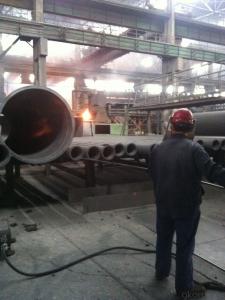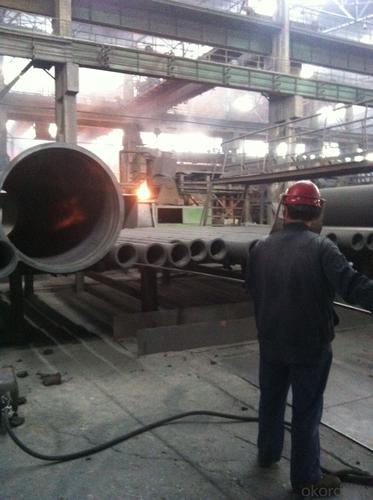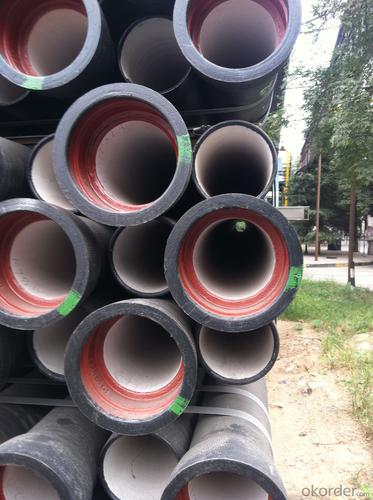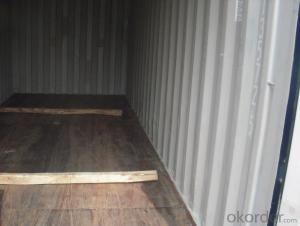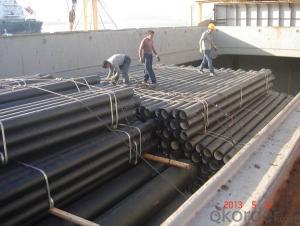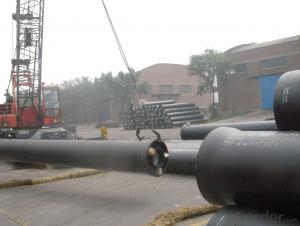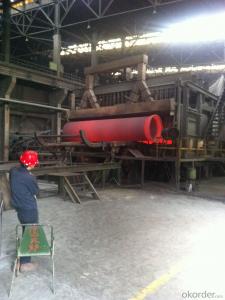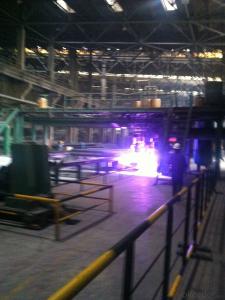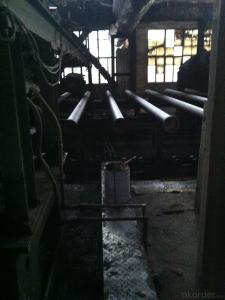DUCTILE IRON PIPES AND PIPE FITTINGS K7 CLASS DN1300
- Loading Port:
- Tianjin
- Payment Terms:
- TT OR LC
- Min Order Qty:
- 22 pc
- Supply Capability:
- 3000 pc/month
OKorder Service Pledge
OKorder Financial Service
You Might Also Like
Material : Ductile Cast Iron
Size Range : DN 80mm to DN 2000mm
Unit Effective Length : 6m or 5.7m
Manufacture Standard: ISO 2531:1998/ EN 545:2006/EN 598:2007
Annual capacity : 200,000 tons
Coating Exterior: Zinc 130g/m2 according to ISO 8179-1 and bitumen coating 70 microns.
Cement Interior: Portland Cement/ High Alumina Cement/ Sulphate Resisting Cement Lining according to ISO 4179
Special requirements on external coating and internal lining can be applied
We also provide accessories such as SBR/EPDM rubber gaskets, lubricant paste, pipe caps, PE sleeves, etc.
Additional Parts:
Each pipe is strictly inspected according to related standard to ensure permanently high performance.
Easy Installation at site and service free for life
Long Service Lifespan
Quotation will arrive you within 24hours once we get your inquiry.
We guarantee offering you a competitive price.
A copy of original inspection reports of pipes will be offered after shipment.
Photos of loading process will be sent to the customer after shipment effect.
We will follow-up the delivery progress after shipment effect and update to the customer on weekly basis.
- Q: How do ductile iron pipes perform in sandy soil conditions?
- Ductile iron pipes perform well in sandy soil conditions due to their inherent strength and durability. The material's high tensile strength allows it to withstand the pressure exerted by the surrounding soil, preventing pipe deformation and breakage. Additionally, the corrosion resistance of ductile iron ensures a longer lifespan, even in corrosive sandy soil environments.
- Q: Does the cast iron pipe for spheroidal graphite need corrosion protection when laying underground?
- Ductile cast iron pipe after annealing, the microstructure is ferrite and pearlite, good mechanical properties, excellent corrosion resistance, good ductility, good sealing effect, simple installation, mainly for municipal, industrial and mining enterprises, water supply, gas, oil etc..
- Q: How are ductile iron pipes connected?
- Ductile iron pipes are typically connected using several methods, including flanged joints, mechanical joints, and push-on joints. Flanged joints involve connecting two pipe sections with a flanged coupling. The pipe ends have flanges that are bolted together, creating a secure and leak-proof connection. This method is commonly used for larger diameter pipes or in applications that require a rigid joint. Mechanical joints utilize a mechanical joint gland and rubber gasket to create a watertight seal. The pipe ends are inserted into the gland, and the bolts are tightened to compress the gasket, ensuring a reliable connection. This method is often used in water distribution systems due to its flexibility and ease of installation. Push-on joints involve using a rubber gasket to create a tight seal between pipe sections. The gasket is placed in a groove on one pipe end, and the other pipe is pushed onto it, creating a compression seal. This method is quick and simple, making it suitable for various applications, including sewer systems and underground piping. Overall, the choice of connection method for ductile iron pipes depends on factors such as pipe diameter, application requirements, and installation conditions. It is crucial to follow the manufacturer's recommendations and industry standards to ensure proper installation and reliable performance.
- Q: Are ductile iron pipes resistant to seismic events?
- Yes, ductile iron pipes are generally resistant to seismic events. Ductile iron is a type of cast iron that is known for its high strength and durability. It has the ability to withstand significant external forces, including those caused by seismic events such as earthquakes. Ductile iron pipes are designed to be flexible and can absorb and dissipate the energy generated by seismic waves. This flexibility allows the pipes to withstand ground movements and vibrations without breaking or cracking. Additionally, the joints of ductile iron pipes are designed to provide some degree of flexibility, which further enhances their resilience against seismic events. Moreover, ductile iron pipes are constructed with thick walls, providing them with a high level of structural integrity. This strength makes them less susceptible to damage during seismic events and helps maintain the flow of water and other fluids even under extreme conditions. However, it is important to note that the resistance of ductile iron pipes to seismic events can also depend on various factors such as the magnitude and proximity of the earthquake, the quality of installation and maintenance, and the specific design considerations for the pipeline system. Therefore, it is crucial to ensure that proper engineering and construction practices are followed to maximize the resilience of ductile iron pipes in seismic-prone areas.
- Q: Are ductile iron pipes suitable for desalination plants?
- Ductile iron pipes are the perfect fit for desalination plants. These plants typically need to move large amounts of water, and using ductile iron pipes has numerous advantages that make them an ideal choice for this purpose. To begin with, ductile iron pipes possess exceptional strength and durability, which are crucial for withstanding the high pressure and corrosive nature of desalinated water. They can easily handle the rapid flow rates and maintain their structural integrity over long distances, ensuring a dependable and efficient water transportation system. Furthermore, ductile iron pipes exhibit excellent resistance to corrosion, a key factor in desalination plants where the water often contains high levels of salt and other minerals. The corrosion-resistant properties of ductile iron pipes ensure that the water quality remains uncompromised and that the pipes have a long service life, ultimately reducing the costs associated with maintenance and replacement. Moreover, ductile iron pipes have a remarkable ability to withstand impacts, making them particularly valuable in desalination plants where pipelines may be exposed to external forces or accidental damage. By being able to endure such impacts, the risk of leaks is significantly reduced, ensuring a steady and uninterrupted supply of water. Additionally, compared to materials like stainless steel or PVC, ductile iron pipes are more cost-effective. They come with a lower initial cost and require less maintenance, making them the more economical choice for desalination plants. In conclusion, ductile iron pipes are undoubtedly the perfect fit for desalination plants due to their strength, durability, resistance to corrosion and impacts, as well as their cost-effectiveness. These pipes are well-equipped to meet the demanding requirements of desalination plants, providing a reliable and efficient water transportation system.
- Q: How do ductile iron pipes handle cyclic loading in offshore applications?
- Ductile iron pipes are known for their exceptional strength and durability, making them a suitable choice for various applications, including offshore use. When it comes to handling cyclic loading in offshore environments, ductile iron pipes have several characteristics that contribute to their performance. Firstly, ductile iron pipes have a high resistance to fatigue failure. Fatigue failure occurs when a material experiences repeated cycles of stress, which can cause cracks to initiate and propagate over time. Ductile iron pipes are designed to withstand cyclic loading without compromising their structural integrity, thanks to their inherent ductility and ability to absorb and distribute stress effectively. Additionally, ductile iron pipes possess excellent impact resistance. Offshore environments are prone to dynamic and unpredictable forces, such as waves and currents, which can exert sudden and high impact loads on the pipes. The high impact resistance of ductile iron allows it to withstand these forces without deformation or fracture, ensuring the pipes remain intact and functional. Moreover, ductile iron pipes have a unique microstructure that enables them to resist corrosion. Offshore applications expose pipes to harsh environmental conditions, including saltwater, which can accelerate the corrosion process. However, the protective graphite matrix in ductile iron pipes acts as a barrier, preventing corrosive agents from reaching the underlying metal and significantly extending the pipes' service life. Furthermore, ductile iron pipes have a high load-carrying capacity. In offshore applications, pipes often need to support heavy loads, such as those from equipment, structures, or seabed settlements. Ductile iron's superior strength allows it to bear these loads effectively, maintaining the structural integrity and stability of the system. Lastly, ductile iron pipes offer ease of installation and maintenance. Their lightweight nature makes them easier to handle and transport during offshore operations. Additionally, their corrosion resistance minimizes the need for frequent maintenance, reducing downtime and costs associated with repairs and replacements. In conclusion, ductile iron pipes exhibit excellent performance in handling cyclic loading in offshore applications. Their resistance to fatigue failure, impact resistance, corrosion resistance, high load-carrying capacity, and ease of installation and maintenance make them a reliable and efficient choice for offshore environments.
- Q: Can cast iron pipes not be used for domestic water supply and drainage?
- Yes, the main use is, outdoor water supply pipe can be PE or ductile iron (socket connection). Indoor water is now used in general plastic pipes, but in the past seems to be able to use ductile iron, as for drainage, generally do pressure type drainage, when the choice is cast iron pipe. There are also indoor fire pipes using welded steel tubes or ductile iron.
- Q: Are ductile iron pipes suitable for underground parking structures?
- Underground parking structures can benefit from the use of ductile iron pipes. These pipes are recognized for their robustness and long-lasting nature, making them an optimal option for underground settings where they may encounter substantial loads or potential impacts. Moreover, ductile iron pipes exhibit exceptional resistance to corrosion, a crucial characteristic in underground environments that are prone to moisture and other corrosive elements. Furthermore, the high tensile strength and flexibility of ductile iron pipes enable them to withstand ground movements and settle without any cracking or breaking, further elevating their suitability for underground parking structures. In sum, ductile iron pipes offer a dependable and enduring solution for fulfilling the drainage and water supply requirements of underground parking facilities.
- Q: What are the different lining materials available for ductile iron pipe?
- There are several different lining materials available for ductile iron pipes. These linings are used to protect the pipe from corrosion and extend its lifespan. Some common lining materials include: 1. Cement Mortar Lining: This lining consists of a layer of cement mortar applied to the interior surface of the pipe. It provides a smooth and durable barrier against corrosion and is commonly used in water and wastewater applications. 2. Polyethylene Encasement: Polyethylene encasement involves wrapping the pipe with a layer of polyethylene film. This lining provides excellent corrosion protection and is often used in aggressive soil conditions. 3. Polyurethane Lining: Polyurethane lining is a spray-applied material that forms a seamless and flexible barrier inside the pipe. It offers superior resistance to chemicals and abrasion, making it suitable for applications involving aggressive fluids. 4. Epoxy Lining: Epoxy lining is a popular choice for lining ductile iron pipes, as it provides excellent resistance to corrosion and chemicals. It is typically applied as a liquid coating that cures to form a smooth and protective layer. 5. Zinc Coating: Zinc coating, also known as galvanizing, involves applying a layer of zinc to the exterior surface of the pipe. This lining provides corrosion resistance and is commonly used in outdoor and exposed applications. These lining materials offer different advantages and are chosen based on the specific needs of the application. Factors such as the type of fluid being transported, environmental conditions, and expected service life are considered when selecting the most suitable lining material for ductile iron pipes.
- Q: What is the typical weight of ductile iron pipes?
- The weight of ductile iron pipes can differ according to their size and thickness. Nonetheless, as a broad reference, smaller diameter pipes typically weigh around 1 pound per foot, while larger diameter pipes can weigh several hundred pounds per foot. The weight of ductile iron pipes is influenced by factors like the dimensions of the pipes, the thickness of their walls, and the particular requirements of the intended use. It is essential to acknowledge that these weights are approximate and subject to variation depending on the manufacturer and product specifications.
Send your message to us
DUCTILE IRON PIPES AND PIPE FITTINGS K7 CLASS DN1300
- Loading Port:
- Tianjin
- Payment Terms:
- TT OR LC
- Min Order Qty:
- 22 pc
- Supply Capability:
- 3000 pc/month
OKorder Service Pledge
OKorder Financial Service
Similar products
Hot products
Hot Searches
Related keywords
